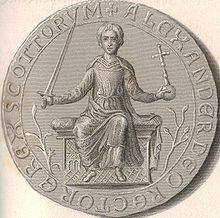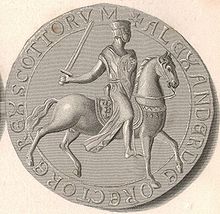- Alexander II of Scotland
-
Alexander II King of Scots Reign 4 December 1214–6 July 1249 Coronation 6 December 1214 Predecessor William I Successor Alexander III Consort Joan of England
Marie de CoucyIssue Alexander III of Scotland
Marjorie (illegitimate)House House of Dunkeld Father William I of Scotland Mother Ermengarde de Beaumont Born 24 August 1198
Haddington, East LothianDied 6 July 1249 [aged 50]
Kerrera, Inner HebridesBurial Melrose Abbey Religion Roman Catholicism Alexander II (Mediaeval Gaelic: Alaxandair mac Uilliam; Modern Gaelic: Alasdair mac Uilleim) (24 August 1198 - 6 July 1249) was King of Scots from 1214 to his death.
Contents
Early life
He was born at Haddington, East Lothian, the only son of the Scottish king William the Lion and Ermengarde of Beaumont. He spent time in England (John of England knighted him at Clerkenwell Priory in 1213) before succeeding to the kingdom on the death of his father on 4 December 1214, being crowned at Scone on 6 December the same year.
King of Scotland
In 1215, the year after his accession, the clans Meic Uilleim and MacHeths, inveterate enemies of the Scottish crown, broke into revolt; but loyalist forces speedily quelled the insurrection.
In the same year Alexander joined the English barons in their struggle against John of England, and led an army into the Kingdom of England in support of their cause. This action led to the sacking of Berwick as John's forces ravaged the north.
The Scottish forces reached the south coast of England at the port of Dover where in September 1216, Alexander paid homage to the pretender Prince Louis of France for his lands in England, chosen by the barons to replace King John. But John having died, the Pope and the English aristocracy changed their allegiance to his nine-year-old son, Henry, forcing the French and the Scottish armies to return home. Shortly after taking London, the Scottish army returned to Scotland.
Peace between Henry III, the French prince and Alexander followed on 12 September 1217 with the treaty of Kingston. Diplomacy further strengthened the reconciliation by the marriage of Alexander to Henry's sister Joan of England on 18 June or 25 June 1221.
The next year marked the subjection of the hitherto semi-independent district of Argyll. Royal forces crushed a revolt in Galloway in 1235 without difficulty; nor did an invasion attempted soon afterwards by its exiled leaders meet with success. Soon afterwards a claim for homage from Henry of England drew forth from Alexander a counter-claim to the northern English counties. The two kingdoms, however, settled this dispute by a compromise in 1237. This was the Treaty of York which defined the boundary between the two kingdoms as running between the Solway Firth (in the west) and the mouth of the River Tweed (in the east).
Joan died in March, 1238 in Essex, and in the following year, 1239, Alexander remarried. His second wife was Marie de Coucy. The marriage took place on 15 May 1239, and produced one son, the future Alexander III, born in 1241.
A threat of invasion by Henry in 1243 for a time interrupted the friendly relations between the two countries; but the prompt action of Alexander in anticipating his attack, and the disinclination of the English barons for war, compelled him to make peace next year at Newcastle. Alexander now turned his attention to securing the Western Isles, which still owed a nominal allegiance to Norway. He successively attempted negotiations and purchase, but without success.
The English chronicler Matthew Paris in his Chronica Majora described Alexander as red-haired:
"[King John] taunted King Alexander, and because he was red-headed, sent word to him,
saying, 'so shall we hunt the red fox-cub from his lairs."[1]Death
Alexander attempted to persuade Ewen, the son of Duncan, Lord of Argyll, to sever his allegiance to Haakon IV of Norway. When Ewen rejected these attempts, Alexander sailed forth to compel him, but on the way he suffered a fever at the Isle of Kerrera in the Inner Hebrides. He died there in 1249 and was buried at Melrose Abbey, Roxburghshire. His only legitimate child and son, by his second wife, Alexander III succeeded him as King of Scots. He had a bastard daughter, Marjorie, who married Sir Alan Durward, Justiciar of Scotia (he died 1275), and had issue.[2]
Wives
1. Joan of England, (22 July 1210 – 4 March 1238), was the eldest legitimate daughter and third child of John of England and Isabella of Angoulême. She and Alexander II married on 21 June 1221, at York Minster. Alexander was 23. Joan was 11. They had no children. Joan died in Essex in 1238, and was buried at Tarant Crawford Abbey in Dorset.
2. Marie de Coucy, who became mother of Alexander III of Scotland
Fictional portrayals
Alexander II has been depicted in a historical novel. :
- Sword of State (1999) by Nigel Tranter. The novel depicts the friendship between Alexander II and Patrick II, Earl of Dunbar. "Their friendship withstands treachery, danger and rivalry".[3]
Ancestry
Ancestors of Alexander II of Scotland 16. Malcolm III of Scotland 8. David I of Scotland 17. Saint Margaret of Scotland 4. Henry, Earl of Northumbria 18. Waltheof II, Earl of Northumbria 9. Maud, Countess of Huntingdon 19. Judith of Lens 2. William I of Scotland 20. William de Warenne, 1st Earl of Surrey 10. William de Warenne, 2nd Earl of Surrey 21. Gundred, Countess of Surrey 5. Ada de Warenne 22. Hugh I, Count of Vermandois 11. Elizabeth of Vermandois 23. Adelaide, Countess of Vermandois 1. Alexander II of Scotland 24. Ralph VII, Viscount of Beaumont 12. Roscelin, Viscount of Beaumont 25. Adenor? de Laval 6. Richard I, Viscount de Beaumont 26. Henry I of England 13. Constance or Maud FitzRoy 27. a mistress 3. Ermengarde de Beaumont 28. Richard I de l'Aigle 14. Richard II de l'Aigle 29. Beatrice 7. Lucie de l'Aigle 15. Edelina Notes
- ^ Scottish annals from English chroniclers A.D.500 to 1286, Alan Orr Anderson, Paul Watkins, 1991.
- ^ http://genealogy.euweb.cz/brit/dunkeld.html#A2
- ^ "Tranter Fist Edition Books, Publication Timeline"
References
- Tewkesbury Annals
- Worcester Annals
- Rotuli Litterarum Patencium
 Chisholm, Hugh, ed (1911). "Alexander II (king of Scotland)". Encyclopædia Britannica (11th ed.). Cambridge University Press.
Chisholm, Hugh, ed (1911). "Alexander II (king of Scotland)". Encyclopædia Britannica (11th ed.). Cambridge University Press. This article incorporates text from a publication now in the public domain: Chisholm, Hugh, ed (1911). Encyclopædia Britannica (11th ed.). Cambridge University Press.
This article incorporates text from a publication now in the public domain: Chisholm, Hugh, ed (1911). Encyclopædia Britannica (11th ed.). Cambridge University Press.
- ^ Scottish annals from English chroniclers A.D.500 to 1286, Alan Orr Anderson, Paul Watkins, 1991.
- ^ http://genealogy.euweb.cz/brit/dunkeld.html#A2
- ^ "Tranter Fist Edition Books, Publication Timeline"
Alexander II of ScotlandBorn: 24 August 1198 Died: 6 July 1249Regnal titles Preceded by
William IKing of Scots
1214–1249Succeeded by
Alexander IIIScottish royalty Preceded by
Margaret of Scotland, Countess of KentHeir of Scotland
as heir apparent
1198–1214Succeeded by
Margaret of Scotland, Countess of KentCategories:- Scottish monarchs
- House of Dunkeld
- Medieval Gaels
- 1198 births
- 1249 deaths
- People from Haddington, East Lothian
- People from East Lothian
- 13th-century Scottish people
Wikimedia Foundation. 2010.



